Best Gaming CPUs for 2025: Top Picks for Maximum Performance
Last updated:
I’ve seen a lot of gamers trip up by picking the wrong CPU. Smooth gameplay really depends on your CPU’s power, not just the graphics card. The Best Gaming CPUs for 2025 handle game logic, physics, and frame pacing so your system stays fast and responsive.
For 2025, the AMD Ryzen 7 9800X3D stands out as the best gaming CPU 2025. It delivers top gaming performance with its 3D V-Cache tech, which cuts down delays and boosts frame rates by up to 15% compared to similar Intel gaming CPUs. Plus, it uses less power, so your PC stays cooler and quieter. Benchmarks show it dominating games like Cyberpunk and Call of Duty at 1440p ultra settings.
If you want a solid value option, the AMD Ryzen 7 7800X3D is great. It offers most of the high-end performance but at a lower price. For budget gamers, the Intel Core i5-12400F is a smart pick. It runs many games well and costs less, making it the best budget gaming CPU for many setups.
One quick tip: match your CPU choice to your budget, the games you play, and whether you multitask while gaming. Also, look for CPUs supporting PCIe 5.0 and DDR5 RAM to keep your rig future-proof.
Choosing the right processor can make or break your gaming experience. I’d say the Ryzen 7 9800X3D is hard to beat in 2025 if you want top processors for gaming that last. To make sure your CPU and GPU work perfectly together, check our detailed guide on CPU bottlenecking.
CPU Specs That Matter Most in the Best Gaming CPUs for 2025
Understanding CPU specs in the Best Gaming CPUs for 2025 helps you avoid overspending on parts you don’t need. Choosing CPUs with the right specs can dramatically boost your gaming performance.
- Core count: More cores and threads help with multitasking and modern games that use many threads.
- Clock speed: Higher clock speed boosts FPS in games that rely on one core.
- Cache size: Bigger cache means faster data access, which helps load game info quicker.
- IPC: Instructions per cycle shows how much work a CPU does each tick, higher is better.
- TDP: Shows heat and power use; lower means easier cooling.
Tip: A 6-core CPU with high clock speed can beat a slower 8-core in many games. Check your game’s CPU needs before buying.
Understanding CPU Specs That Matter for Gaming
Knowing CPU specs for gaming helps you avoid spending too much on parts you don’t really need. Picking the right specs can boost your gaming performance a lot.
- Core count: More cores and threads help with multitasking and modern games.
- Clock speed: Higher speed means better FPS in games that use one core mostly.
- Cache size: Bigger cache lets your CPU access game data faster.
- IPC: Shows how much work a CPU does per clock tick, higher means better efficiency.
- TDP: Affects how much heat and power the CPU uses, which matters for cooling.
Tip: A 6-core CPU with high clock speed often beats a slower 8-core in many games. Always check your game’s CPU needs before buying.
Clock Speed and Overclocking in the Best Gaming CPUs for 2025
Clock speed, measured in GHz, shows how fast a CPU performs each cycle. The Best Gaming CPUs for 2025 reach higher GHz and deliver smoother gameplay since many games still rely heavily on single-threaded performance. A CPU running at 5.0 GHz will usually run games smoother than one at 3.5 GHz, even if they are the same generation.
Overclocking CPU means pushing it beyond its rated speed to get more power. This can boost performance by 5 to 15 percent in some games. CPUs like Intel K-series and AMD Ryzen overclock well. But, results vary because of the silicon lottery, some chips can handle higher speeds better than others.
Keep in mind, overclocking also brings risks. It makes your CPU hotter, uses more power, and can cause crashes or shorten CPU life. It may even void your warranty. That’s why a good cooling system is a must if you try overclocking.
I’ve tried overclocking a Ryzen CPU, and with a good cooler, I saw noticeable FPS gains. But without proper cooling, it quickly got unstable. So, be careful and plan ahead if you want to overclock.
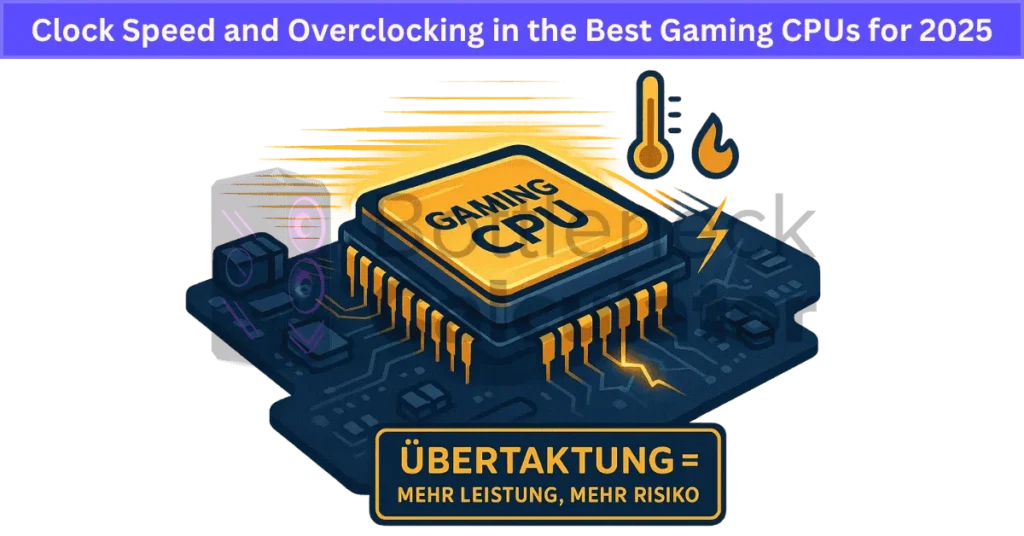
Cores and Threads in the Best Gaming CPUs for 2025
Cores are like little processors inside your CPU. Each core can work on its own task. Threads let a core handle more than one task at the same time. Intel calls this Hyper-Threading, and AMD calls it SMT (Simultaneous Multithreading).
For gaming in 2025, 6 to 8 cores are the sweet spot. More cores don’t always mean better gaming because many games don’t use tons of cores well. But having extra cores and threads helps when you do more than just play games.
Here are times when multi-threading really helps:
- Streaming your gameplay live
- Running apps in the background while gaming
- Playing new, next-gen games that use more cores
Take the AMD Ryzen 7 9800X3D as an example. It has 8 cores and 16 threads, which gives it an edge in both single-thread and multi-threaded performance. Benchmarks show it running games smoothly while handling other tasks.
Pro tip: Many new AAA games recommend 8-core CPUs, so a 6-core vs 8-core CPU difference could matter soon. Picking a CPU with good core and thread count also helps future-proof your build.
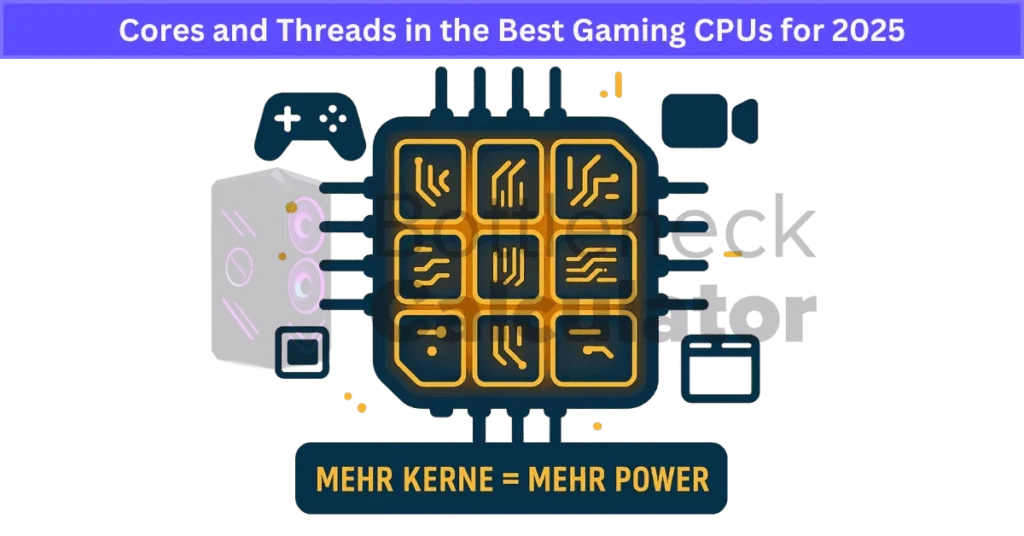
CPU Architecture Advances and Why They Matter for Gaming
CPU architecture means how the processor is built inside. It changes how fast and efficient the CPU works, even if two CPUs have the same clock speed or core count. One big factor here is IPC, instructions per cycle. Higher IPC means the CPU does more work each tick, which improves gaming performance.
Here’s how AMD’s Zen series evolved:
- Zen 2: Big IPC boost over earlier designs
- Zen 3: Improved core layout for better speed and efficiency
- Zen 4: More power efficiency and faster clock speeds
- Zen 5: Refined design with up to 15% IPC gains over Zen 4 (based on official benchmarks)
AMD’s 3D V-Cache stacks extra cache on top of the CPU chip. This lowers the time it takes for the CPU to get game data, which means better FPS in games. The Ryzen 7 9800X3D uses this tech to dominate gaming benchmarks.
One quick tip: Understanding CPU naming conventions helps. For example, Intel’s 13th Gen “Alder Lake” CPUs use hybrid cores, mixing fast performance cores with efficient ones. Knowing this helps you pick the right CPU for your needs.
If you’re choosing between Intel and AMD, checking their architecture improvements is key since it affects real-world gaming performance.
| Spec | Why It Matters for Gaming | Recommended for 2025 |
|---|---|---|
| Clock Speed (GHz) | Higher speed = better FPS, especially in single-threaded tasks | 4.5 GHz or higher |
| Cores / Threads | Enables smooth multitasking and modern game performance | 8 cores / 16 threads (ideal) |
| Single-Thread Performance (IPC) | Determines how efficiently a CPU processes instructions | High IPC (Zen 4/5, Intel Raptor/Arrow Lake) |
| Cache Size (L3) | Reduces latency for frequently accessed data | 96MB+ for 3D V-Cache CPUs |
| TDP (Thermal Design Power) | Impacts heat and power usage; affects cooling needs | 65W–125W for gaming CPUs |
| Overclocking Support | Lets you push extra performance beyond rated specs | Yes (Intel K-series, AMD Ryzen unlocked) |
| Architecture | Newer design means higher IPC and better efficiency | AMD Zen 4/5 or Intel 14th Gen+ |
| PCIe Support | Faster GPU and storage data transfers | PCIe 5.0 for future-proofing |
| Memory Support | High-speed RAM boosts FPS and smooth gameplay | DDR5, 5200 MHz+ recommended |
| Integrated Graphics (iGPU) | Helpful for troubleshooting or budget builds | Optional but good fallback |
| Power Efficiency | Lower power means less heat and stable performance | Optimized (under 125W) |
| Price-to-Performance Ratio | Best value without overspending | $250–$600 range for most gamers |
What Makes a CPU Great for Gaming in 2025?
I’ve seen many games depend a lot on the CPU, especially strategy and simulation titles like Cities: Skylines II or Microsoft Flight Simulator. These games are CPU-bound, meaning the CPU limits performance more than the GPU. Other games rely mainly on the GPU for graphics, but a slow CPU can still cause frame pacing issues or stutters. That’s why CPU performance matters a lot.
In 2025, gaming CPU trends bring big improvements. AMD’s Zen 5 boosts IPC and power efficiency, so CPUs run faster and cooler. Intel’s Arrow Lake uses hybrid architecture, mixing fast performance cores with efficient ones, to handle multitasking and gaming better. AMD’s 3D V-Cache technology stacks extra cache on the chip, cutting latency and giving big FPS gains in CPU-heavy games.
Understanding CPU-GPU interaction helps avoid bottlenecks. When the CPU is too slow, it can hold back the GPU, causing frame drops or lag. A balanced system keeps both working smoothly. Imagine a flow where the CPU sends game data to the GPU, which renders frames; if the CPU lags, the GPU waits.
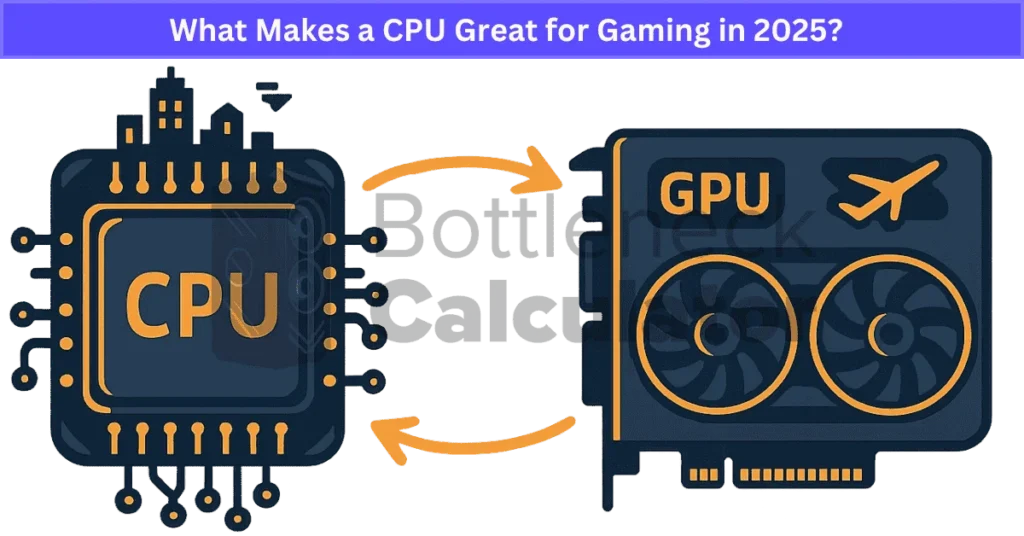
Quick tip: Always pick a CPU that matches your GPU’s power. That way, you get the best gaming CPU 2025 experience without wasting money or performance.
Top Gaming CPUs and Performance Analysis
Top High-End Gaming CPUs in 2025
If you’re serious about gaming, high-end CPUs matter for max FPS, smooth streaming, and future-proofing your rig. These processors handle the toughest games and multitasking without breaking a sweat.
The AMD Ryzen 7 9800X3D tops the list for best high-end gaming CPUs 2025. It costs around $480 and uses 3D V-Cache technology, which gives huge FPS gains—up to 15% better than Intel’s top CPUs in games like Cyberpunk 2077.
Next is the Intel Core i9-14900K. It has 20 cores and 28 threads with strong boost clocks. This CPU shines in heavy multitasking and gaming but needs good cooling to reach its full potential.
For those who game and create content, the AMD Ryzen 9 9950X is a solid pick. It balances gaming performance with high-core counts, making it perfect for streaming or editing while gaming.
Quick tip: Pair these CPUs with top-tier GPUs to avoid bottlenecks. Also, keep in mind AMD’s AM5 socket and Intel’s LGA 1700 platform for future upgrades.
Best Mid-Range Gaming CPUs for 2025
Many players prefer mid-range chips from the Best Gaming CPUs for 2025 because they strike a perfect balance between high FPS and affordability.
The AMD Ryzen 7 7700X leads the pack as the best mid-range gaming CPU 2025. It offers a solid price-to-performance ratio around $300 and runs games smoothly.
The Ryzen 7 9700X is newer with upgraded architecture, giving strong gaming power for around $320.
Intel’s mid-tier Core i7 models pack higher base clock speeds, which helps games that don’t use many cores. They also handle multitasking well.
For budget-conscious gamers, the Ryzen 5 9600X is a smart pick. It fits the lower end of mid-range, priced near $250, yet delivers solid performance in many popular titles.
Mid-range CPUs usually pair best with GPUs like the RTX 4070 or RX 7800 XT. This combo gives you future-proof gaming without overspending. If you want gaming CPU performance that lasts but don’t want the top-tier price, mid-range is the way to go.
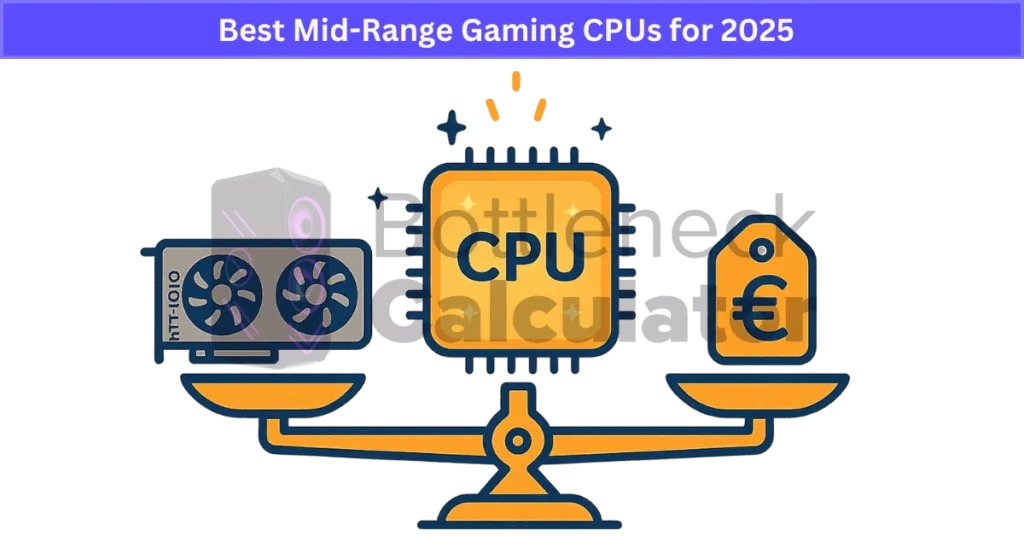
Best Budget Gaming CPUs for 2025
Budget gaming CPUs still deliver solid gaming performance for most players, especially at 1080p. You don’t need the top CPU to get good FPS in many popular games.
The Intel Core i5 lineup offers the best value for 1080p gaming. These CPUs are affordable, usually between $180 and $250, and run most modern games smoothly.
Older AMD Ryzen models like the Ryzen 5 5600X are also great bargains now. After newer CPUs launched, prices dropped, making these budget-friendly gaming processors a smart choice.
While benchmarks show lower scores compared to high-end CPUs, the real-world difference is often small for mid-range builds. CPU bottlenecks mainly happen if you use a high-end GPU or play at very low resolutions.
These budget CPUs pair well with GPUs like the RTX 3060 or RX 7600, offering balanced performance without overspending. If you want a solid 1080p gaming CPU without breaking the bank, these are the best budget gaming CPUs 2025.
Benchmarking Gaming CPUs
Understanding CPU Benchmarks for Gaming
CPU benchmarks for gaming are tests that show how well a processor runs games. They matter because they help gamers pick the best CPUs for smooth gameplay and high FPS.
Benchmarks work by running standardized tests on CPUs using the same hardware setup. This makes results fair and easy to compare. Gaming FPS benchmarks measure how many frames per second a CPU can handle in popular titles like Cyberpunk or Call of Duty.
These tests create CPU ranking charts, showing which processors perform better or worse. Gamers use these charts to find the best gaming CPUs performance for their budget and needs.
For trusted results, sites like TechPowerUp, Tom’s Hardware, and UserBenchmark provide reliable CPU benchmarks. I’d say it’s smart to check multiple sources before deciding. That way, you get a clearer picture of real-world gaming CPU strength.
Benchmarks by Game Type: What to Look For
Game genre matters a lot when checking CPU benchmarks for gaming. Different games use the CPU in different ways, so knowing what to look for helps you pick the right processor.
Strategy and simulation games need strong multi-core gaming performance because they run many tasks at once. Competitive shooters rely more on high single-core speed to get the best FPS.
Here are some tips to keep in mind:
- Competitive games: Focus on CPUs that give high FPS at 1080p for smooth play.
- Open-world games: Look for smooth frame pacing and low stutter to avoid lag spikes.
- Simulation and AI-heavy titles: Check multi-threaded benchmark results since these games use many cores.
In 2025, CPUs like the Ryzen 7 7700X, 7800X3D, 9800X3D, and Ryzen 9 9950X perform well across these genres. Some games run better on Intel CPUs, while others favor AMD, so it’s smart to check benchmarks for your favorite titles.
Also, consider FPS charts at different resolutions (1080p, 1440p, 4K) and pay attention to frame pacing consistency, not just raw FPS, for the best gaming experience.
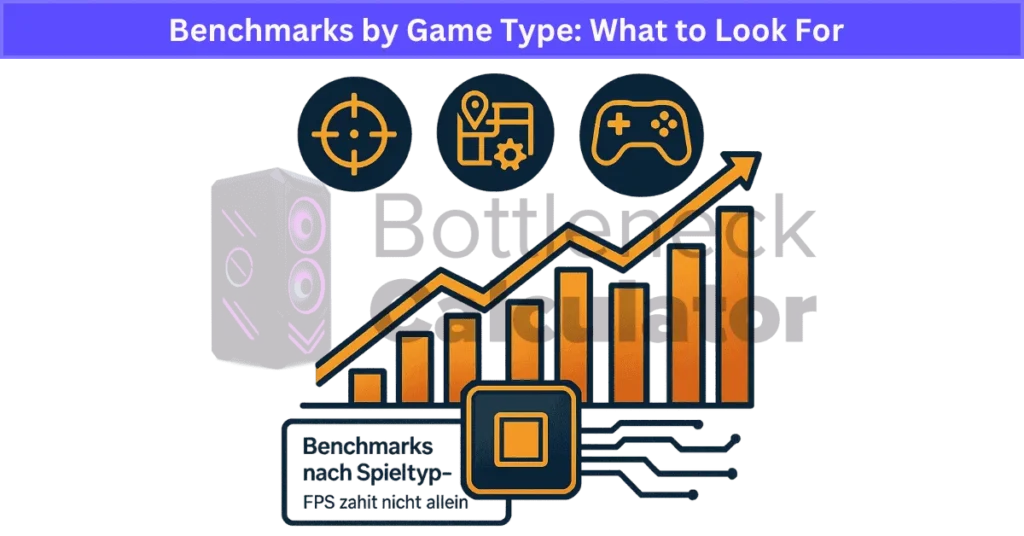
Real-World Benchmarks & Gaming Performance
Real-world benchmarks are the best way to pick a gaming CPU because they show how processors perform in actual games, not just on paper. They help gamers see what to expect in FPS and smoothness.
How to Read Benchmarks
In gaming, single-core performance often matters most because many games rely on one fast core. Multi-core performance helps when you stream or run other apps while gaming. Besides raw FPS, look at frame pacing and FPS consistency, they keep gameplay smooth without stutters.
Game Benchmarks (1080p / 1440p / 4K)
At 1080p, CPU choice has the biggest impact on FPS. For example, the AMD Ryzen 7 9800X3D hits high FPS in Cyberpunk 2077 and CS2 compared to mid-range CPUs. At 1440p and 4K, the GPU limits performance more, but CPU still affects minimum FPS, important for avoiding drops in fast-paced games like Call of Duty.
| CPU Model | Cyberpunk 1080p FPS | CS2 1440p FPS | CoD 4K FPS |
|---|---|---|---|
| AMD Ryzen 7 9800X3D | 95 | 140 | 120 |
| Ryzen 7 7700X | 85 | 130 | 115 |
| Intel i9-14900K | 90 | 135 | 118 |
| Intel i5-14600K | 80 | 125 | 110 |
Trusted sites like TechPowerUp and Tom’s Hardware back these numbers. Remember, CPU impact is bigger at lower resolutions and with high refresh rate monitors (144Hz+).
If you want the best gaming CPU benchmarks 2025, look for CPUs with strong single-core speed and solid multi-core performance for streaming and multitasking.
Recommended CPU-GPU Pairing Chart
Picking the right CPU and GPU together is key to avoid bottlenecks and get the best gaming performance. Matching your CPU to your GPU helps you spend smartly, whether you’re on a budget or want high-end power.
| Tier | CPU Options | GPU Options | Ideal Resolution | Budget |
|---|---|---|---|---|
| Mid-Range | Ryzen 5 7600 / Intel i5-13400F | RTX 3060 / RX 7600 | 1080p High | Mid-Range |
| High-End | Ryzen 7 7800X3D / Intel i5-14600K | RTX 4070 / RX 7800 XT | 1440p Ultra | High-End |
| Enthusiast | Ryzen 7 9800X3D / Intel i9-14900K | RTX 4080 / RX 7900 XTX | 4K Ultra | Enthusiast |
For esports gamers using 144Hz or 240Hz monitors, make sure your CPU-GPU combo can keep up with high frame rates. Budget builds often do well pairing a mid-range GPU with a budget CPU for good cost efficiency at 1080p. This chart shows some of the best CPU-GPU combos 2025 for balanced, smooth gaming.
Considerations Beyond the CPU
Choosing the Right GPU for Your Gaming CPU
Choosing the right GPU matters just as much, sometimes even more, than the CPU for gaming performance. The GPU handles all the graphics, so a powerful one can really boost your FPS and visual quality.
For budget builds, mid-range GPUs like the RTX 4060 or RX 7600 work great paired with mid-tier CPUs. These combos handle 1080p and 1440p gaming smoothly without overspending.
High-end setups need top GPUs like the RTX 4080 or RX 7900 series to match premium CPUs like the Ryzen 7 9800X3D. This avoids bottlenecks and lets you max out settings, especially at 4K.
Integrated graphics like AMD Ryzen APUs or Intel Iris Xe are fine for casual or entry-level gaming but can’t run demanding titles well.
Quick tip: Always balance your CPU and GPU, pairing a top GPU with an entry-level CPU wastes potential. For example, a Ryzen 7 7700X + RTX 4070 is a solid combo for 1440p gaming with enough VRAM (12GB+) for high resolutions.
Best Memory and Storage Setup for Gaming in 2025
RAM speed and storage type matter a lot for modern gaming performance. Faster memory helps games run smoothly, and quick storage cuts down loading times.
For memory, DDR5 gaming RAM is the best choice for new builds because it’s faster and more future-proof. You want at least 16GB of RAM for gaming, but 32GB is ideal if you stream or multitask. DDR4 at 3200MHz+ still works well, but DDR5 at 5200MHz+ gives better speed with the latest CPUs.
When it comes to storage, an NVMe SSD is fastest for your OS and games you play often. A common setup is a 1TB NVMe SSD as the primary drive and a secondary SSD or HDD for your larger game library. NVMe drives load games much faster than SATA SSDs or HDDs, making your gameplay smoother and loading screens shorter.
If you want ultra-fast storage, PCIe 4.0 and PCIe 5.0 NVMe SSDs offer great speed boosts. Also, using a secondary SATA SSD instead of an HDD speeds up access to less-played games.
Upgrading memory and storage is one of the easiest ways to improve your gaming experience in 2025.
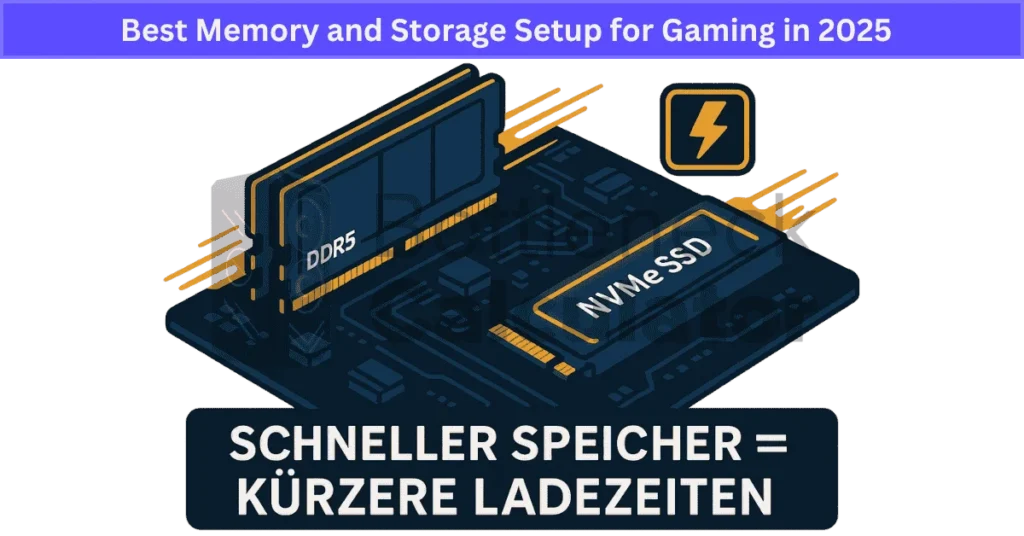
Power and Cooling: Essential for Gaming CPU Performance
Power and cooling are key to keeping your gaming PC stable and running at its best. Without enough power or good cooling, your CPU can throttle, causing FPS drops and lag.
For power, aim for a 750W or higher PSU if you have a mid to high-end build. Always choose quality, like 80+ Gold certified PSUs from trusted brands such as Seasonic or EVGA. Using a PSU calculator from these brands helps pick the right wattage for your setup.
Cooling options vary. Air coolers are affordable and work well for most CPUs. If you plan to overclock or have a high-TDP CPU, an AIO liquid cooler is a better choice. Enthusiasts might go for custom loops for top-tier cooling.
For gaming laptops, thermal solutions are critical because tight spaces trap heat more easily. Good fans and heat pipes keep performance steady.
A quick case airflow tip: use two intake fans and one exhaust fan to create positive pressure inside the case. This improves cooling and reduces dust buildup.
Proper power and cooling prevent thermal throttling, which can cause FPS drops in gaming benchmarks. Keeping your CPU cool means smoother gameplay.
Real User Fixes & Community-Backed Solutions
On r/buildapc, a user asked about the best AMD processor for gaming in 2025 with a 7800XT GPU, debating between the pricey 7900X3D and cheaper options like the 7600X or 9600X. They wanted good value since their games aren’t very CPU-heavy.
Replies advised that the 7600X is the best budget pick since the 7900X3D is expensive and hard to find. Many said at 1440p gaming, the GPU matters more than CPU, so spending less on CPU and more on GPU makes sense. Some noted certain games are more CPU-demanding, but overall, prioritize GPU and get a decent CPU like the 7600X.
On r/buildapc, a user named BrainwashJosh asked for advice on upgrading their gaming CPU around a $400 budget, debating between Intel and AMD options. They noted that single-core speed is key for gaming and were interested in the Ryzen 5 7600X3D because of its large L3 cache, seeking recommendations for similar CPUs in that price range.
Community members mostly recommended the Ryzen 7 5700X3D as a great budget-friendly option, especially if the user has an AM4 motherboard, since it offers solid gaming performance at a lower price. Others suggested the Ryzen 5 7600X3D bundles if available near retailers like Microcenter. Some pointed out that used CPUs like the 7800X3D or 5800X3D could be good deals too. Intel’s newer 14700K was mentioned as a decent option but often at a higher price point. Overall, the consensus favored AMD’s 3D V-Cache chips for gaming in that budget.
A technology enthusiast asked about the ideal CPU and GPU combinations for various high-performance uses like gaming, content creation, and AI workloads. Respondents highlighted AMD’s Ryzen 9 9950X3D and 7900X3D CPUs with large 3D V-Cache as top contenders, praised for gaming and multitasking. On the GPU side, AMD’s recent RDNA 3 GPUs were noted for strong rasterization performance, higher VRAM, better Linux support, and driver stability, while Nvidia’s RTX 40 and upcoming 50 series cards excelled in ray tracing and AI workloads but faced criticism for driver and quality control issues.
The community emphasized choosing parts based on use case and budget. For pure gaming, AMD’s 3D V-Cache CPUs paired with either AMD’s high-end GPUs or Nvidia’s for better ray tracing were common recommendations. The discussion also touched on factors like VRAM importance, power efficiency, future-proofing with newer APIs, and the growing appeal of Linux-compatible hardware, making AMD solutions attractive for many users.
Final Verdict
When it comes to performance, the Best Gaming CPUs for 2025 unlock your system’s full potential. The AMD Ryzen 7 9800X3D leads the pack with its advanced 3D V-Cache technology, delivering top-tier gaming performance, great efficiency, and future-proof features like PCIe 5.0 and DDR5 support. Mid-range options like the Ryzen 7 7800X3D and budget picks such as the Intel Core i5-12400F offer excellent value without sacrificing smooth gameplay, making it easier to find a CPU that fits your budget and gaming needs.
Balancing your CPU with a compatible GPU and investing in fast RAM and storage will ensure steady FPS and reduce bottlenecks. While overclocking can provide extra performance, it requires proper cooling and care. Overall, focus on CPUs with strong single-thread and multi-core performance, modern architecture, and sufficient cores (6–8) to handle both gaming and multitasking smoothly. This balanced approach guarantees the best gaming experience without overspending on unnecessary hardware.
FAQ’s
Which is the best CPU for gaming in 2025?
The best CPU for gaming in 2025 is the AMD Ryzen 7 9800X3D. Its 3D V-Cache technology gives it a big boost in gaming performance. This CPU delivers strong frame rates in modern games, making it perfect for high-end setups targeting 1440p and 4K gaming.
How many CPU cores for gaming 2025?
Six cores hit the sweet spot for most gamers in 2025. A hexa-core CPU like the Intel i5 12400 offers great performance in modern titles at both 1080p and 1440p. It also handles light multitasking well, so you can keep apps like Discord or Spotify running while you game without issues.
What is the highest performing CPU for gaming?
Top Gaming CPUs in 2025
AMD Ryzen 7 9800X3D – Best Overall Gaming CPU
AMD Ryzen 7 9700X – Strong Alternative Pick
Intel Core i7-14700K – Another Great Choice
AMD Ryzen 5 9600X – Best Mid-Range Option
Intel Core i5-14600K
AMD Ryzen 7 5700X3D
AMD Ryzen 9 9950X3D
Intel Core i9-14900K
Which is the no. 1 gaming processor?
Intel and AMD are the top brands offering the best processors for gaming. Intel’s popular models include the Core i3, i5, i7, and i9 series. AMD’s well-known options are Ryzen 5, Ryzen 7, and Ryzen 9. Picking the right processor based on your gaming needs can greatly improve your overall gaming experience.

